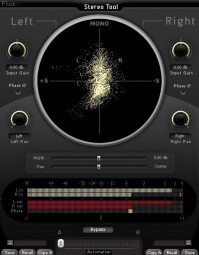Today, our journey across the mastering world takes us into the slippery terrain of stereo enhancers.
What are they?
As you might suspect, a stereo enhancer allows you to make the stereo field of a mix seem larger. But you shouldn’t forget either, that this type of processor also allows you to reduce the width of the stereo field. Most of these processors are usually multiband, so you can enlarge certain frequency bands and shrink others. Its applications are, thus, multiple:
- Provide more breadth to your mix
- Recover some punch
- Rebalance an off-center stereo image
- Emphasize the “dramatic” aspect of certain parts
As always, take it easy with the processing to stay on the safe side.
Advice
First of all, you should know that using a stereo enhancer isn’t mandatory. If the stereo balance of your mix is all right, what’s the point? In mastering, as in many other domains, less is more! The less processing you apply, the more natural the result in relation to the original intention of the mix.
Moreover, the use of this type of processors may entail mono compatibility problems. As a consequence, it is imperative to check frequently that the gain in stereo width isn’t at the cost of precision in mono.
Finally, do not use headphones when working with stereo enhancers, because it can be counterproductive. When listening with headphones, your left ear won’t hear anything on the right channel and vice versa, which goes against the operating principle of certain stereo enhancers.
In practice
Let’s move on to the practical cases now. To intensify the perception of stereo width, focus on the high end of the frequency range. To be more precise, right above the highest frequency reached by the vocals, to make sure that they remain at the center of the mix. Increase the processing gradually, always keeping in mind mono compatibility. To that end, you can use a goniometer.
To give some punch to a wimpy mix, it might be useful to recenter the low end. In order to achieve that, you can use a stereo enhancer to tighten only the low frequencies. Focus on the sound of the bass and the kick drum, so they become more precise, which will give your song a nice oomph.
When it comes to rebalancing an off-center stereo image, you can also use this type of plug-in. However, the result will never be as good as if you solved the problem at the source — namely at the mix level. And if you are doing home mastering, you will always have the option to revisit your mix. So, in such cases we strongly recommend you to roll up your sleeves and tackle the problem at the root.
Finally, the stereo enhancer, together with the automation functions of your DAW, can make wonders enhancing the “emotional” — and even “dramatic” — aspect of a part! Indeed, in music as in photography, it is all a matter of contrast. Thus, white will seem whiter if put against a deep black rather than a light gray. In audio terms, that means that a part of your song will sound larger if the previous one is almost mono. To achieve that, you have to reduce the stereo width of the part that comes right before the one you want to emphasize, and then enlarge the stereo field accordingly at the right moment. Grandeur guaranteed!
Tools of the trade
Here you have a non-exhaustive list of plug-ins to apply stereo enhancing:



